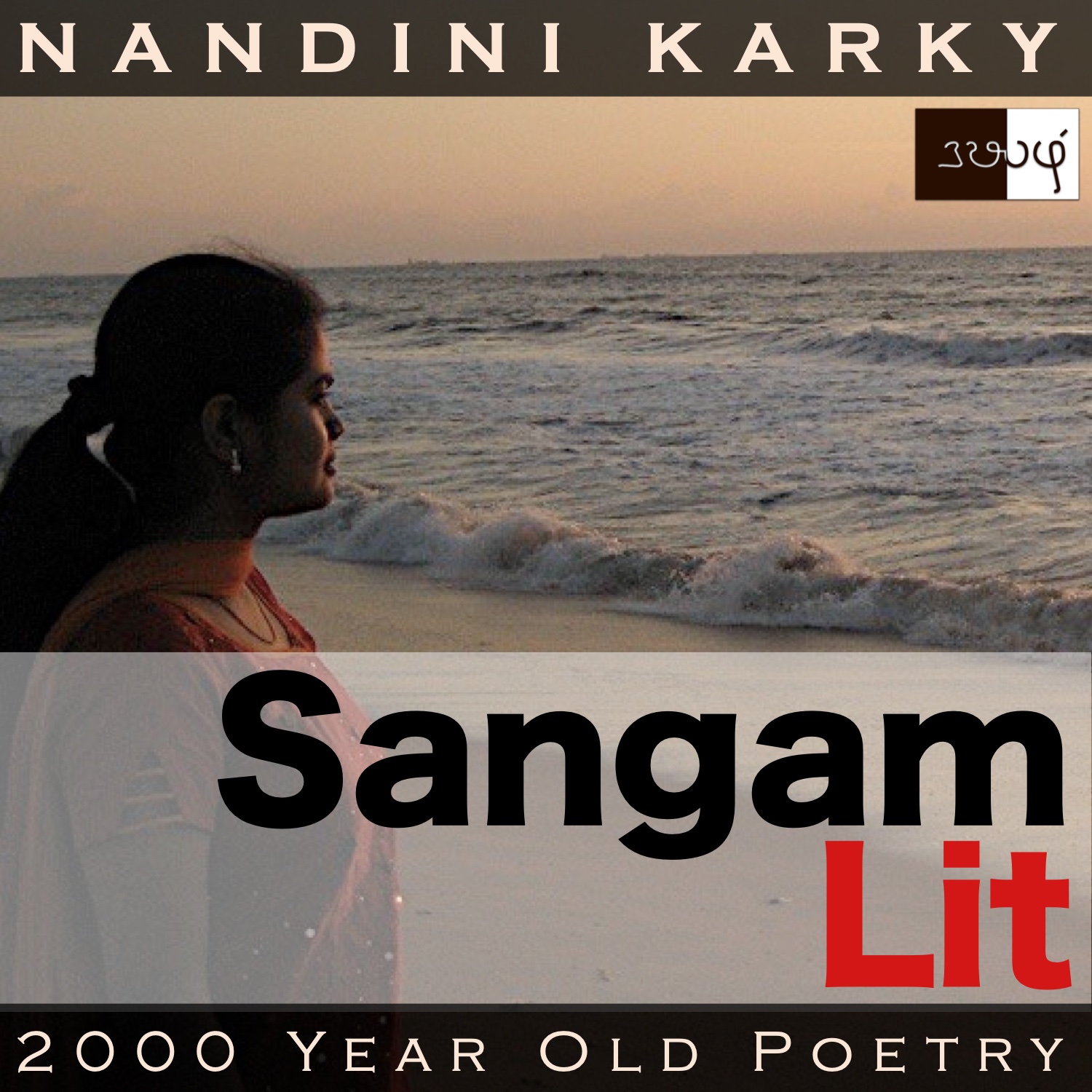Podcast: Play in new window | Download
Subscribe: Apple Podcasts | Spotify | Amazon Music | Android | iHeartRadio | Email | TuneIn | RSS | More

In this episode, we journey through world of dreams, depicted in Sangam Literary work, Natrinai 87, written by Nakkannaiyaar. The poem is set in the ‘Neythal’ landscape or the coastal regions and speaks in the voice of the lady to her confidante, sharing the sensations from a dream she had.
உள் ஊர் மா அத்த முள் எயிற்று வாவல்
ஓங்கல்அம் சினைத் தூங்கு துயில் பொழுதின்,
வெல் போர்ச் சோழர் அழிசிஅம் பெருங் காட்டு
நெல்லி அம் புளிச் சுவைக் கனவியாஅங்கு,
அது கழிந்தன்றே-தோழி!-அவர் நாட்டுப்
பனி அரும்பு உடைந்த பெருந் தாட் புன்னை
துறை மேய் இப்பி ஈர்ம் புறத்து உறைக்கும்
சிறுகுடிப் பரதவர் மகிழ்ச்சியும்,
பெருந் தண் கானலும், நினைந்த அப் பகலே.
The poem opens with the scene of a lush mango tree in the middle of the village as revealed by ‘உள் ஊர் மா’. The camera zooms on to ‘முள் எயிற்று வாவல்’ or ‘a bat with thorn-like teeth’. And what might this bat be doing? The phrase ‘தூங்கு துயில்’ tells all. At first glance, this phrase seems to be made of repetitive elements, because both ‘தூங்கு’ and ‘துயில்’ mean ‘sleep’ in contemporary Tamil. However, in this poem, ‘தூங்கு’ means ‘to hang’. The phrase thus flashes before our eyes, a bat hanging upside down on the branch of a mango tree and having a snooze. Following the sleeping bat, a Chola king ‘அழிசி’ makes his royal appearance. Seeing the sense of sight dominate the proceedings, taste thrusts itself forth with ‘நெல்லி அம் புளிச் சுவை’ meaning ‘the sour taste of gooseberry’. The very thought makes the mouth water! The evergreen ‘புன்னை’ or ‘laurelwood’ greets us from the shore where lies scattered, ‘இப்பி’ or ‘oysters’. Having taken a glance at these individuals, let’s move on to find the interwoven meaning of this collective!
The man and the lady have been in a relationship and the man parts from her to gather wealth. In this period of separation, the lady turns to the confidante one day and says, “Hanging on the high branches of the mango tree in the centre of our village, sleeps a thorn-toothed bat. As it sleeps during the day, it dreams of tasting the sour gooseberry growing in the beautiful, vast forests of the victorious Chola king, Azhisi. Alas, the dream fades away, O friend! Fades like my dream of being on the vast, cool shore and seeing the happiness of the fisherfolk living in little hamlets in my man’s country, where the cool buds of the thick-trunked ‘punnai’ bursts open and showers the pollen, decorating the wet backs of the oysters roving on the shore!” With these words, the lady reveals her dream of being with her man and thus expresses her pain as she sees that joyous event so real, vanish away in a moment.
It’s time for the interpretation of dreams! The lady talks about two different dreams. One is the dream of the fruit bat, hanging on the mango tree. And, what is it dreaming of? It dreams of tasting the gooseberry fruit and not just any gooseberry but those found in the vast forests of the Chola king Azhisi. This king Azhisi is said to be a skilled warrior in the battlefield and his domain was the ‘aarcaud’ town on the banks of the River Cauvery, not to be confused with the similar-sounding North Arcot region in Tamilnadu. Coming back to the bat, it dreams of a fruit so far away and is relishing the sourness of the fruit when what seemed to be alive within the mouth, vanishes without a trace. This must be one health-conscious bat for it favours the sour gooseberry far off to the sweet mango so close by! As any Indian would vouch, gooseberry is known for its nutritive value and high vitamin C content. Returning from our reality to the reality of the bat, we see it smack its lips and taste the nothing there. Then, the lady talks about her dream. The dream where she saw the vast shore and the happy fisherfolk of the man’s land and there, she sees the ‘punnai’ trees shedding the fine pollen from the blossoms and decorating the wet oysters that rove on the shore. In an indirect way, she’s conveying the scene of her meeting with her man on the shore in those days past, which seems to dance in her head once again as a dream. Two different dreams which the lady weaves together by saying that they both fade. It seems so real, the elements there, be it the gooseberry fruit or the ‘punnai’s pollen. The dreamers could see it, touch it and taste it. And yet, in one moment, it all vanishes. Those dreams of the day that fade away!
Dreams have indeed fascinated human thought all through time! This mysterious and magical, unconscious behaviour seems to have a life of its own. Be it in the mythology of the ancient world or the psychology of the modern world, dreams are one of the star players. Interesting to add another gem to our knowledge of dreams through this poem from so long ago. I find this reference unique because it links the dream of a living creature and that of a human being as if to subtly show that we are one with the life that abounds around. Let’s part saying, dream on, dear lady, and hope your dreams turn true soon!




Share your thoughts...